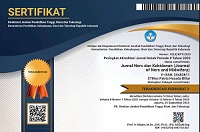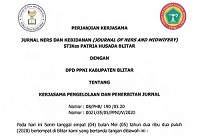Systematic Review : The Effect of Intervention Rehabilitation “Computer-Based Cognitive Training Program†to Improve Cognitive Skills of Children with ADHD
DOI:
https://doi.org/10.26699/jnk.v8i2.ART.p263-269Keywords:
cognitive training, computer, ADHD, childAbstract
Attention Deficit Hyperactivity Disorder (ADHD) is a medical condition characterized by an inability to concentrate, hyperactivity, and impulsiveness. Children with ADHD tend to be careless, irritable, difficult to gather, difficult to carry out orders so it is important to treat this condition as early as possible. The purpose of this study was to analyze studies according to computer program-based cognitive rehabilitation interventions to improve the cognitive abilities of children with ADHD on empirical studies in the last five years. Journals or articles were obtained by searching in databases indexed by Scopus, PubMed, Science Direct, Garuda Portal using adequate keywords. The quality assessment of the study used inclusion and exclusion criteria. The framework used to conduct the review was PICOS and the inclusion criteria used English and Indonesian journals from 2015 to 2020. The data analysis and tabulation were carried out in articles or journals. Title, abstract, full text, and methodology were assessed to determine the eligibility of the article or journal. Researchers found 15 journals that match the inclusion and exclusion criteria, and passed the study selection and quality assessment. 7 journals discuss about training-based intervention programs and 8 journals discussed the game or game-based intervention programs. The 15 journals obtained came from four continents, Asia, America, Australia, and Europe. Computer-based intervention significantly improved the cognitive abilities of children with ADHD such as concentration skills, working memory, and academic learning outcomes. Modifications need to be made, among others, to facilitate parents who can not afford compatible facilities and infrastructure. In Indonesia, the modifications that are possibly made are the daily training program compared to video games.References
Azami, S. et al. (2016). A Pilot Randomized Controlled Trial Comparing Computer-Assisted Cognitive Rehabilitation, Stimulant Medication, and an Active Control in The Treatment of ADHD. Child and Adolescent Mental Health, 21(4), pp. 217–224.
Benzing, Valentin and Schmidt, Mirko. (2017). Cognitively and Physically Demanding Exergaming To Improve Executive Functions of Children with Attention Deficit Hyperactivity Disorder: A Randomized Clinical Trial. BMC Pediatrics, 17(1), pp.1-8.
Bikic, A., Leckman, J. F., et al. (2015). Cognitive Computer Training in Children with Attention Deficit Hyperactivity Disorder (ADHD) Versus No Intervention: Study Protocol for a Randomized Controlled Trial. TRIALS, 16(1), pp. 1–13.
Bikic, A., Christensen, T. Ø., Leckman, J. F., et al. (2017). A Double-Blind Randomized Pilot Trial Comparing Computerized Cognitive Exercises to Tetris in Adolescents with Attention-Deficit/Hyperactivity Disorder. Nordic journal of psychiatry. England, 71(6), pp. 455–464.
Bikic, A., Leckman, J. F., et al. (2018). Attention and Executive Functions Computer Training for Attention-Deficit/Hyperactivity Disorder (ADHD): Results from a Randomized, Controlled Trial. European Child & Adolescent Psychiatry. Department of Child and Adolescent Mental Health Services Southern Jutland, Region of Southern Denmark, Aabenraa, Denmark; Department of Clinical Research, University of Southern Denmark, Odense, Denmark ; Yale Child Study Centre, Yale University, New Hav: Springer Nature B.V., 27(12), pp. 1563–1574.
Blackshaw, S. Y. et al. (2019). ä¹³é¼ å¿ƒè‚Œæå– HHS Public Access. Physiology & Behavior. 176(3), pp. 139–148.
Steeger M. C., Gondoli D. M., Gibson B. S., and Morrissey. (2016). Combined Cognitive and Parent Training. Child Neuropsychol,150(2), pp. 137–143.
Darmawati, S. and Nuryani, N. (2020). Perkembangan Bahasa Pragmatik Pada Anak Attention Deficit Hyperactivity Disorder (ADHD): Kajian Neurolinguistik. Journal of Early Childhood Education (JECE), 2(1), pp. 21–36.
Farias, A. C., Cordeiro, M. L., et al. (2017). Attention–Memory Training Yields Behavioral and Academic Improvements in Children Diagnosed with Attention-Deficit Hyperactivity Disorder Comorbid with A Learning Disorder. Neuropsychiatric Disease and Treatment. Auckland: Taylor & Francis Ltd., 13, pp. 1761–1769.
Haryanti, Dwi. dkk. (2018). Gambaran Perilaku Orang Tua Dalam Stimulasi pada Anak yang Mengalami Keterlambatan Perkembangan Usia 0-6 Tahun. Jurnal Keperawatan Jiwa, Volume 6 No 2, Hal 64 – 70.
Hayati, D. L. and Apsari, N. C. (2019). Pelayanan Khusus Bagi Anak dengan Attentions Deficit Hiperactivity Disorder (ADHD) di Sekolah Inklusif. Prosiding Penelitian & Pengabdian Mayarakat, 6(1), pp. 108–122.
Johnstone, S. J. et al. (2017). Game-Based Combined Cognitive and Neurofeedback Training Using Focus Pocus Reduces Symptom Severity in Children with Diagnosed AD/HD and Subclinical AD/HD. International Journal of Psychophysiology. Elsevier B.V, 116, pp. 32–44. .
Kirk, H. E. et al. (2016). Computerised Attention Training for Children with Intellectual and Developmental Disabilities: A Randomised Controlled Trial. Journal of Child Psychology and Psychiatry, and Allied Disciplines. England, 57(12), pp. 1380–1389
Ko, E. J. et al. (2020). A Tablet Computer-Based Cognitive Training Program For Young Children With Cognitive Impairment: A Randomized Controlled Trial. Medicine, 99(12), p. e19549.
Nursalam. (2014). Manajemen Keperawatan: Aplikasi dalam Praktik Keperawatan Profesional. 4th edn. Jakarta: Penerbit Salemba Medika.
Nursalam. (2016). Metodologi Penelitian Ilmu Keperawatan: Pendekatan Praktis. 4th edn. Jakarta : Penerbit Salemba Medika
Sammy, R. R., et al. (2017). Working Memory Training in Children with Neuropsychiatric Disorders and Mild To Borderline Intellectual Functioning, The Role Of Coaching; A Double-Blind Randomized Controlled Trial. BMC Psychiatry. London: BioMed Central, 17 (1), pp. 1–9.
Rosa, V. de O., Schmitz, M., Moreira-Maia, C. R., Wagner, F., Londero, I., Bassotto, C. de F., Moritz, G., de Souza, C. D. S., et al. (2017). Computerized Cognitive Training In Children and Adolescents with Attention-Deficit/Hyperactivity Disorder As An Add-On Treatment to Stimulants: Feasibility Study and Protocol Description. Trends in Psychiatry and Psychotherapy. Brazil, 39(2), pp. 65–76.
Sari, D. P., Asrori, M., and Radiana, U. (2016). Pemanfaatan Game Edukasi Berbasis Open Source Bagi Anak Attention Deficit Hyperactivity Disorder (ADHD). Jurnal Pendidikan dan Pembelajaran Untan, 5(1), pp. 1–16.
Simone, M. et al. (2018). Computer-Assisted Rehabilitation of Attention in Pediatric Multiple Sclerosis and ADHD patient: A Pilot Trial. Journal BMC Neurology, 18(1), pp. 1–11.
Umroh, N. S., Adi, E. P. and Ulfa, S. (2019). Multimedia Tutorial Untuk Menumbuhkan Minat Baca Anak ADHD (Attention Deficit Hyperactivity Disorder). Jurnal Kajian Teknologi Pendidikan, 2(1), pp. 45–52.
Wexler, B. E. et al. (2020). An Integrated Program of Computer-Presented And Physical Cognitive Training Exercises For Children With Attention-Deficit/Hyperactivity Disorder. Psychological Medicine. Cambridge University Press






